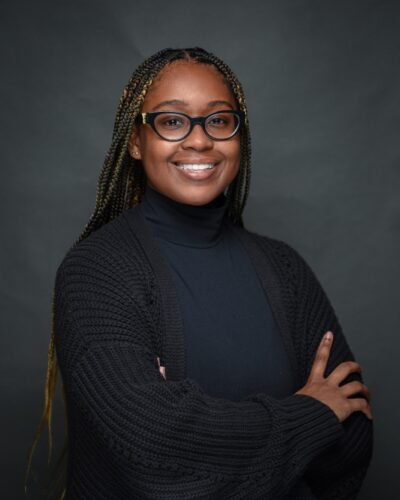Meet Meghan Campbell
Written by the SSR Diversity Committee in celebration of Black History Month
February is Black History Month! The SSR Diversity Committee is participating in this celebration! This time, Dr. Mario Binelli (SSR Diversity Committee) met with Meghan Campbell to discuss her goals, dreams, achievements, and history. Enjoy the reading!

MB: Tell us a bit about your background and current position.
MC: I’m from Orlando, FL, my parents are educators in the State school system. I started developing interest in agriculture during mid-school and that interest consolidated during college at FAMU (Florida A&M University, 1890 Historically Black University). During my Bachelor’s in Veterinary Technologies I conducted research in cattle nutrition and metabolomics under the guidance of Dr. John Odhiambo. In the Fall of 2021, I received a National Needs Fellowship from the USDA and started my Master’s at the University of Florida with the guidance of Dr. Mario Binelli. We worked with the metabolomics of puberty attainment in beef heifers. After my defense, I switched gears, and I’m now a doctoral student in the Family, Youth and Community Sciences at UF.
MB: What were your biggest academic and scientific challenges when working with reproduction?
MC: I had limited experience working with large animals, especially on modern facilities and equipment like they had in UF, so that was a learning process. Also, during my master’s, having to find information on topics I did not know and building my own knowledge arsenal was a lot of work.
MB: How did you overcome those challenges?
MC: Well, I cried a little bit (laughter), but help came from lab mates that made themselves available to support me whenever I requested. That was a great experience of teamwork and team spirit.
MB: In what ways did your heritage affect your perspective and your career trajectory?
MC: Family from both my parents’ side owned land in Georgia. When my grandparents passed away, they wanted to sell the land because nobody else knew how to farm. But part of the family decided to keep the land and do something with it. That picked my curiosity and drove my interest to become a veterinarian. That was my track until the second year of my bachelor’s. I worked as a vet tech for a while and I don’t think I’d be able to deal with animal suffering, and also did not see myself as able to deliver bad news to people. Just witnessing the vets having to do that broke my heart. I took the alternative path, pursued research, and that changed my plans.
MB: Did you switch tracks now, away from reproduction?
MC: Yes, I’m pursuing my PhD now in Family, Youth and Community Sciences. Even with all the support I had in the lab and Department, sometimes in conferences, I got the “what are you doing here?” kind of look, being one of the few black people around. Then I started thinking, how could I contribute to having more minorities in animal sciences? How do we get more minorities involved in agriculture? This is a hard thing to do when people don’t see other people that look like you. So, for my doctorate, I’m coming up with a project trying to cultivate minority youth involvement and interest in agriculture.
MB: Wow! This is so cool! Now, what are your future career goals, after you get your PhD?
MC: Still defining, but for now I think I’d like to work and develop programs to increase minority participation, especially in rural communities. Do they have support? Do they know that here is more to agriculture than farming? So, promotion.
MB: Do you have any final words for someone that may get inspired reading this blog?
MC: You can always pivot in life! You never know where your path is going to lead you to. Although I loved animal sciences, I know there is a reason why a left. Perhaps to reach other people. If what I’m doing will help me reach, then I’m doing the right thing!

